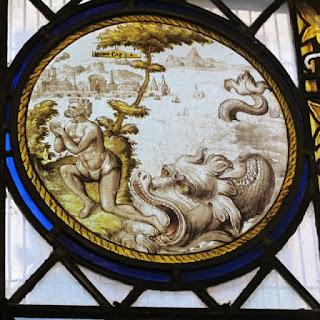Three Men In A Boat (1889) by Jerome K. Jerome, is an old favourite that has us laughing out loud every time we open it (the pages of our copy are all falling apart, and now I see that it can be downloaded onto the Kindle for free, we'll do that), but some of its passages veer towards a more serious tone:
George said:I came across a very similar idea last week in a short story I'd photocopied for our German conversation group to read, this one written about 100 years later than Jerome K. Jerome's:
... 'We must not think of the things we could do with, but only of the things that we can't do without.'
George comes out really quite sensible at times. You'd be surprised. I call that downright wisdom [...] with reference to our journey up the river of life generally. How many people, on that voyage, load up the boat till it is in danger of swamping with a store of foolish things which they think essential to the pleasure and comfort of the trip, but which are really only useless lumber.
How they pile the poor little craft mast-high with fine clothes and big houses; with useless servants, and a host of swell friends that do not care twopence for them, and that they do not care three ha' pence for; with expensive entertainments that nobody enjoys, with formalities and fashions, with pretence and ostentation, and with –– oh, heaviest, maddest lumber of all! –– the dread of what will my neighbour think ...!
It is lumber, man –– all lumber! Throw it overboard.
... Let your boat of life be light, packed with only what you need –– a homely home and simple pleasures, one or two friends, worth the name, someone to love and someone to love you, a cat, a dog and a pipe or two, enough to eat and enough to wear, and a little more than enough to drink; for thirst is a dangerous thing.
You will find the boat easier to pull then, and it will not be so liable to upset, and it will not matter so much if it does upset; good, plain merchandise will stand water. You will have time to think as well as to work...
Das kleine Boot begann schon bald gefährlich to schwanken. "Wir sind zu schwer," rief der Mann, "wir müssen einiges ins Wasser werfen, damit wir nicht unter die Wellen gedrückt werden!" Und er begann sein Gepäck aus dem kleinen Boot zu werfen. Das Mädchen nestelte an den dicken Knoten, mit denen die Eltern das große Paket verschnürt hatten. Aber sie konnte sie nicht lösen...This modern "fairy story" (Eine Insel im See, by Roland Kübler) is about a young couple on a boat in the wild sea. The girl has left her parents, to sail away with the young man, but before she leaves home the parents give her a parcel––ein großes Paket––of things they think she will need for her new life. When a storm blows up, the weight of the parcel threatens to capsize the boat, so the man tells her to get throw it away. She tries to undo the string that ties up her endowment, so as to jettison part of it, but it's knotted too tightly. Her fingers bleed with the hopeless attempt. In the end a wave knocks young people and parcel overboard. The girl cannot swim if she clings to it; the man frees her from it and it's gone. They land on a deserted island.
"Du mußt das Paket ins Wasser werfen!" ... Verzweifelt versuchte er, das Boot durch die Wellen zu rudern. Er wußte: mit dieser Last im Boot würden sie das Unwetter nicht überstehen. ..."Wirf alles raus oder wir werden untergehen!"
"Ich habe alles verloren! Alles! Nichts ist mir geblieben!" Sie schluchzte. "Wir hätten soviel brauchen können für unser neues Leben."She bewails the loss of her parents' gift. The man does not answer, but lights a fire from driftwood and holds her in his arms. Then she begins to realise that her inheritance wasn't so indispensable after all.
...Und plötzlich begriff sie, daß sie mehr als nur ihr nacktes Leben gerettet hatte. Durch den Verlust all dessen, was ihr so nützlich und unentbehrlich erschienen war, hatte sie ein neues, ein eigenes Leben gewonnen...There was some discussion, at our German morning, as to whether that story made a valid point or not!











